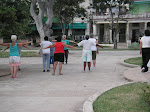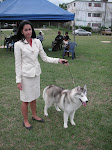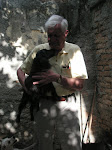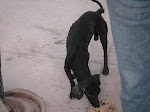Humane and Humanitarian
Ask any English speaker what is a "humane" society, and you'll be told it is a group that protects animals. And so it is, but in the 1800's, humane societies focused more on orphaned children than on animals. Jeannette Ryder, the American woman who founded Cuba's Banda de Piedad in the early 1900's originally focused on both children and animals, but she came to concentrate on animals.
Today humane societies work only on animal issues as modern governments have taken over the protection of children, orphans, and families. I wondered how the dictionary reflects this evolution of meaning, and I was disappointed to learn that the Oxford English Dictionary (OED), nearly everyone's authority, doesn't even mention animals in its definition of "humane." Even dictionaries can get to be way behind the times.
The US government uses the term "humanitarian" to define an exception to the tough rules restricting travel to Cuba. They fall in nicely with the OED which says "humanitarian" means "concerned with human welfare." Well, then, how have I been able to travel five times to Cuba under a "humanitarian" exception to the rules?
Surely my work is directed at animal, not human welfare. Well, not so fast, I say. The primary effort of Cuba's Aniplant organization is massive spay-neuter campaigns. Through them we now fund the sterilization of a few thousand cats and dogs every year. This work is reducing the number of strays on the streets as unrestricted breeding diminishes. Sterilization is the only humane (in the animal welfare sense) way to reduce the number of stray animals on the streets. Well, how does sterilization further "humanitarian" goals (in the human welfare sense)?
Rabies is the answer. While it is a rare disease in advanced societies, it is carried by wild animals and can never be fully controlled. Outbreaks can occur anywhere at any time. In recent years some African and Asian cities without good rabies control programs have been shocked at how rapidly rabies can take hold and threaten many people.
The number of strays (homeless animals) on the streets outside of homes who can be bitten by a sick raccoon, fox or bat is the driving factor in the risk of a rabies outbreak. Sterilization reduces this number and therefore reduces the incidence of rabies in humans. For this reason, animal sterilization is a humanitarian endeavor. That is how I qualify to travel to Cuba.
Well, didactic discourses on words like humane and humanitarian are boring, but here's a statistic that will shock you. Every year rabies kills 50,000 people worldwide. Yes, they're in Asia and Africa for the most part, but rabies control is the concern of most governments in the world, even in some of the smallest island nations.
Unfortunately some stray animal control programs are inhumane and Cuba operates one of them. Stray animals are caught by a cadre of dogcatchers, quarantined without food for a few days, and finally poisoned with strychnine. But studies have shown that when you reduce the number of stray animals by killing them, nature soon produces more animals to take their place. But if a stray is neutered, he still occupies his niche, nature doesn't (indeed it can't) replace him, and the population declines slowly. This is the basis of all TNR (trap, neuter, release) programs.
We think massive spay-neuter programs of the type Aniplant conducts in Cuba are so superior to killing strays that it almost goes without saying. Certainly dog and cat lovers among us would prefer to see that country with a diminishing number of homeless animals as opposed to too many animals with a high incidence of sick and injured ones. As tensions ease between Cuba and the US, soon Americans will once again visit Cuba at will. We are working so that Cuba can show its visitors a country that has responsibly acted to assure animal and human health.
Les Inglis
Friday, September 16, 2011
Subscribe to:
Post Comments (Atom)






























































































No comments:
Post a Comment